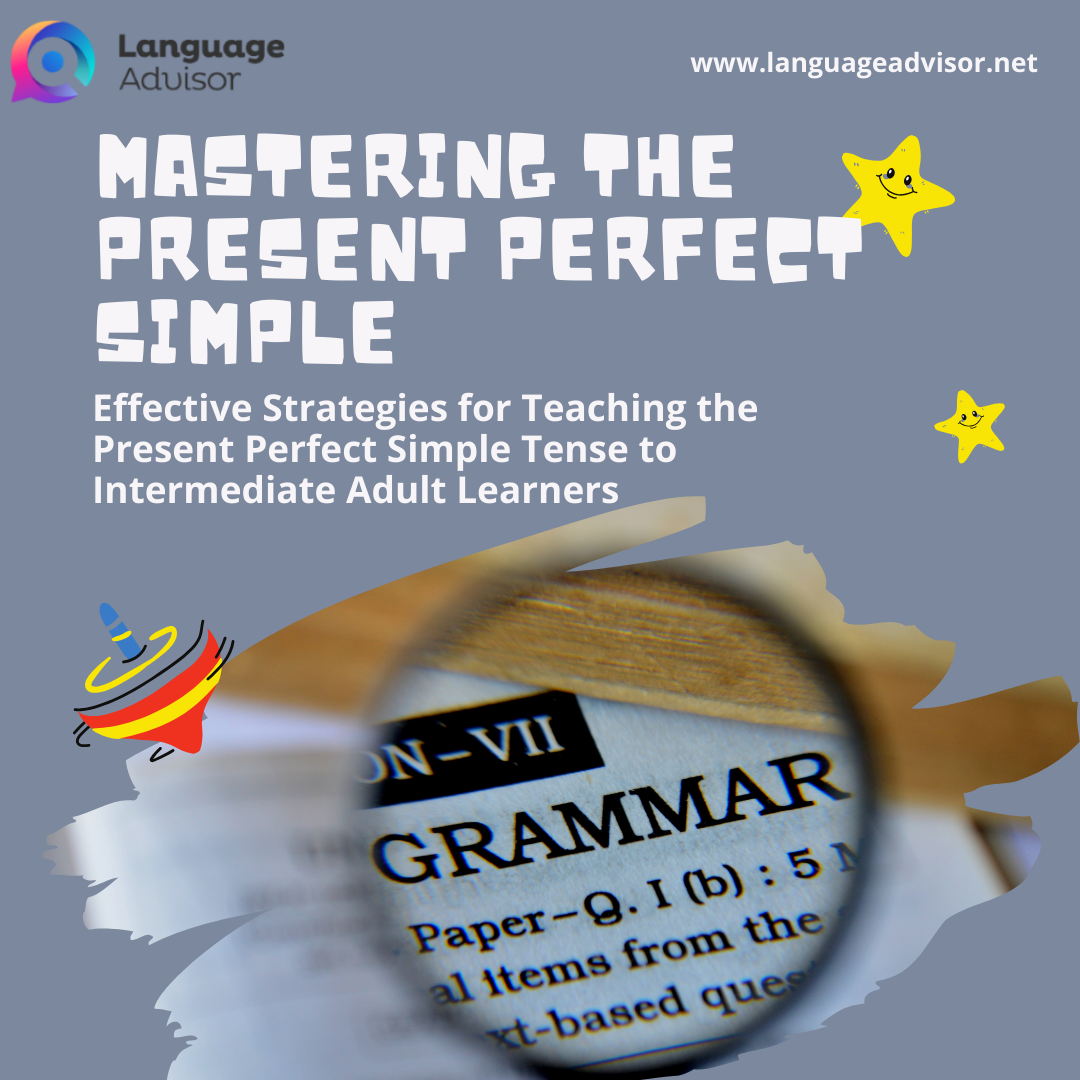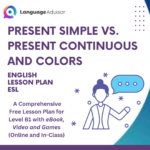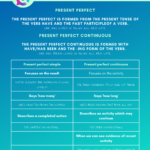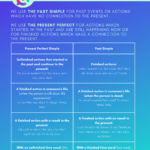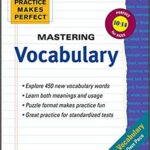Mastering the Present Perfect Simple: A Comprehensive ESL Lesson Plan. Effective Strategies for Teaching the Present Perfect Simple Tense to Intermediate Adult Learners
Mastering the Present Perfect Simple: A Comprehensive ESL Lesson Plan.

Mastering the Present Perfect Simple: A Comprehensive ESL Lesson Plan
Teaching the present perfect simple tense can be challenging, but with well-structured lessons, you can make it an engaging and rewarding experience for your intermediate adult learners. Here’s a detailed lesson plan to help you navigate through this topic effectively.
Mastering the Present Perfect Simple: Learning Objective
- Revision, fixation, and extension of knowledge of the present perfect simple.
- Level: Intermediate
- Ages: Adults
Stage 1: Warm-Up/Review
Teacher’s Objective: Introduce the subject matter
Kick off the lesson by introducing the present perfect simple tense with practical applications. Write a few sentences on the board that illustrate this tense, which will serve as reference points throughout the lesson.
Examples:
| Positive | Negative | Question | |
|---|---|---|---|
| I/you/we/they | I have spoken. | I have not spoken. | Have I spoken? |
| he/she/it | He has spoken. | He has not spoken. | Has he spoken? |
Inquire about the students’ existing knowledge to gauge their understanding.
Student Activity: Students listen and pay attention to the material presented on the board.
Stage 2: Presentation
Explain the basic function of the present perfect simple
I will write the basic function of the present perfect simple on the board, inquiring as to the students’ existing knowledge.
Examples:
- “We use the present perfect simple (have/has + past participle) or present perfect continuous (have/has + been + -ing) to talk about a state or an activity that has a link to the present.”
- “The present perfect simple suggests completion while the continuous suggests something is unfinished.”
- “The present perfect simple expresses an action that is still going on or that stopped recently, but has an influence on the present. It puts emphasis on the result.”
Procedure – Students
Listening, asking questions, paying attention to the material on the board.
Practice
Go into further detail about the subject material
I will hand out the worksheet and allow students to go through it, assisting them individually and as a class. Once the sheet is complete, I will go through it as a class and identify any areas which they may be struggling in, then review those specific areas.
After this, I’d arrange an activity that allowed students to choose the correct sentence in an interactive and cooperative manner.
Procedure – Students
Students should be actively participating, asking questions and answering them, thinking about the material and how it would apply to them and their future or current careers.
Stage 3: Practice
Teacher’s Objective: Go into further detail about the subject material
Hand out a worksheet and allow students to complete it individually and as a class. Once completed, review the answers together to identify and address any problem areas. Follow this with an interactive activity where students choose the correct sentences cooperatively.
Student Activity: Students actively participate by asking and answering questions, thinking about the material, and applying it to their contexts.
Example Worksheet Activities:
- Conjugate the verb in parentheses using the form indicated:
- How long ______ (he/live) in New Jersey?
- Peter ______ (not play) baseball since 1987.
- Choose the correct time expression used with the present perfect tense:
- They have lived in that house (since/for) ten years.
- She has (just/yet) gone to the bank.
Stage 4: Production
Teacher’s Objective: Ensure students can use the present perfect simple in context
Students will engage in practical exercises to reinforce their understanding.
- Complete sentences using the present perfect simple:
- How long has he lived in New Jersey?
- Peter hasn’t played baseball since 1987.
- Correctly identify and use time expressions:
- They have lived in that house for ten years.
- She has just gone to the bank.
Student Activity: Students work individually and in pairs to practice using the present perfect simple, both in writing and speaking. They should focus on creating sentences and using appropriate time expressions.
Stage 5: Cooler
Teacher’s Objective: Wrap up the lesson with a fun and engaging activity
End the lesson with a fun activity like Pictionary to reinforce vocabulary and sentence structure. Draw on the board and have students guess the sentences.
Student Activity: Students participate in the game, reinforcing their understanding of the lesson in a relaxed and engaging manner.
Present Perfect Simple Worksheets
Present Perfect Positive Form Review
Subject + have + past participle + objects
Examples:
Tom has lived in New York for ten years.
We have studied French since 2003.
Present Perfect Negative Form
Subject + have not + past participle + objects
Examples:
She hasn’t met Peter.
They haven’t finished the job yet.
Present Perfect Question Form
(Question Word) + have + subject + past participle?
Examples:
Has she worked here for a long time?
Where has she gone?
Important Note!
Regular past participles end in ‘-ed’, irregular past participles of verbs vary and must be studied.
Yet / Just / Already
- ‘Yet’ is used in the present perfect negative and question forms.
- ‘Just’ is used in the present perfect positive form.
- ‘Already’ is used in the present perfect positive form.
Examples:
Have you finished the job yet?
She’s just left for Chicago.
Since / For
- ‘Since’ and ‘for’ are common time expressions used with the present perfect tense. ‘Since’ is used with specific dates. ‘For’ is used with periods of time.
Present Perfect Worksheet 1
Conjugate the verb in parentheses using the form indicated. In the case of questions, use the indicated subject as well.
- How long ______ (he/live) in New Jersey?
- Peter ______ (not play) baseball since 1987.
- I ______ (speak) Russian for twenty years.
- We _____ (not see) Tom since Christmas.
- ________ (Alan/fly) in an airplane before?
- Shannon _____ (not/go) to lunch yet.
- Our class _____ (take) a field trip three times this year.
- Where _____ (they/move) to?
- Jennifer _____ (ask) that question four times today.
- You _____ (not eat) lunch yet, have you?
- Jason _____ (want) to move to New York since he was five years old.
- How long _____ (they/know) Peter?
- Alexandra _____ (work) for IBM since 2002.
- Jeff _____ (buy) a few books this week.
- Sally ______ (not read) that book yet.
- _____ (they/leave) for work yet?
- Bill _____ (not/drive) very far today.
- We _____ (enjoy) eating seafood all of our lives.
- _____ (he/watch) the documentary yet?
- I _____ (not/finish) the job yet.
Present Perfect Worksheet 2
Choose the correct time expression used with the present perfect tense.
- They have lived in that house (since/for) ten years.
- She has (just/yet) gone to the bank.
- Franklin hasn’t arrived in Boston (yet/already)
- We have worked at this company (since/for) 2008.
- Jason hasn’t telephoned me (since/for) two weeks.
- How (long/much) have you known Susan?
- They’ve (already/yet) studied the past simple tense.
- Our mothers have (just/yet) left for the station.
- The President has traveled to more than twenty countries (since/for) he was elected.
- Thomas hasn’t had time to read the book (just/yet).
- Alice has told me she’s (yet/already) been to that park.
- My daughter’s (just/since) finished her homework.
- Have they (already/yet) spoken to Mr. Peters?
- I’ve (just/for) interviewed the best candidate for the job.
- Our coach hasn’t chosen the starting team (already/yet).
- Bob and Tim have (already/yet) decided where they are going on vacation.
- Have you purchased the new computer (just/yet)?
- Sam has wanted to go to Japan (for/since) he was a little child.
- Jason hasn’t worked here (since/for) very long.
- Our boss has (just/yet) hired a new engineer.
Answer Sheet
Present Perfect Worksheet 1 – Answers
- How long has he lived in New Jersey?
- Peter hasn’t played baseball since 1987.
- I have spoken Russian for twenty years.
- We haven’t seen Tom since Christmas.
- Has Alan flown in an airplane before?
- Shannon hasn’t gone to lunch yet.
- Our class has taken a field trip three times this year.
- Where have they moved to?
- Jennifer has asked that question four times today.
- You haven’t eaten lunch yet, have you?
- Jason has wanted to move to New York since he was five years old.
- How long have they known Peter?
- Alexandra has worked for IBM since 2002.
- Jeff has bought a few books this week.
- Sally hasn’t read that book yet.
- Have they left for work yet?
- Bill hasn’t driven very far today.
- We have enjoyed eating seafood all of our lives.
- Has he watched the documentary yet?
- I haven’t finished the job yet.
Present Perfect Worksheet 2 – Answers
- They have lived in that house for ten years.
- She has just gone to the bank.
- Franklin hasn’t arrived in Boston yet.
- We have worked at this company since 2008.
- Jason hasn’t telephoned me for two weeks.
- How long have you known Susan?
- They’ve already studied the past simple tense.
- Our mothers have just left for the station.
- The President has traveled to more than twenty countries since he was elected.
- Thomas hasn’t had time to read the book yet.
- Alice told me she’s already been to that park.
- My daughter’s just finished her homework.
- Have they already spoken to Mr. Peters?
- I’ve just interviewed the best candidate for the job.
- Our coach hasn’t chosen the starting team yet.
- Bob and Tim have already decided where they are going on vacation.
- Have you purchased the new computer yet?
- Sam has wanted to go to Japan since he was a little child.
- Jason hasn’t worked here for very long.
- Our boss has just hired a new engineer.
Mastering the Present Perfect Simple: Conclusion
By following this structured lesson plan, ESL teachers can effectively introduce and reinforce the present perfect simple tense to intermediate adult learners. Through a combination of clear explanations, practical exercises, and interactive activities, students will gain a solid understanding of how to use the present perfect simple in various contexts. This approach not only enhances their grammatical skills but also boosts their confidence in applying these concepts in real-life situations.

Also check out these lesson plans


